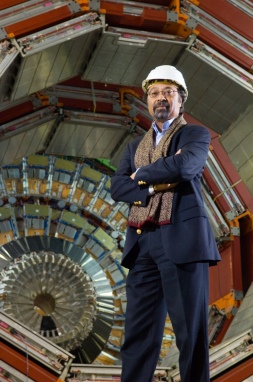Imperial physicists share world's biggest science prize
by Simon Levey

Particle accelerator interior at CERN
Imperial physicists share in new $3 million prize for fundamental physics work to discover Higgs boson
Three Imperial physicists will receive a share of a new $3 million prize, awarded for their part in identifying a Higgs-like boson at the Large Hadron Collider (LHC) particle accelerator at CERN.
The Fundamental Physics Prize Foundation will honour a total of seven scientists for their leadership role in the scientific endeavour that led to the discovery the new Higgs-like boson, namely the LHC accelerator, and the CMS and ATLAS experiments. A separate $3 million prize is awarded to theoretical physicist Professor Stephen Hawking.
New laureates of the Special Fundamental Physics Prize include experimental physicists Professor Tejinder (Jim) Virdee FRS, Visiting Professor Dr Lyn Evans FRS and Senior Research Investigator Dr Michel Della Negra, who all hold positions in Imperial's Department of Physics. The prizes will be given at a ceremony at CERN on 20 March 2013.

Professor Jim Virdee stands in front of the CMS particle detector during its contruction
Dr Della Negra and Professor Virdee are considered founding fathers of the CMS, carrying out the first preliminary studies to detect a Higgs boson in 1990. Together they also played significant roles in the conception and construction of the experiment over the subsequent 20 years.
Professor Virdee was the spokesperson for the collaboration from 2007 to 2009 and recently celebrated 30 years at Imperial.
On hearing about the prize he said: "Bravo to the collaboration and their dedication to make this one of the most beautiful scientific experiments ever. Many scientists, engineers and technicians came together to build a powerful detector that will still have the potential to produce remarkable physics for years to come."
Dr Della Negra said: "I am delighted to receive this prize as it recognizes the incredible feat of thousands of our collaborators. All their talents and resources have been needed to build, operate and analyse the data from CMS."
Dr Evans was Project Leader of the Large Hadron Collider accelerator during the time it was being constructed. He said: "It's fantastic news. We have faced many challenges that we have overcome together, but the tremendous performance of ATLAS, CMS and the collider is witness to the skill and dedication of our many collaborators which we are very proud to represent."
Through particle collisions at the LHC, scientists are studying reactions that happened in our universe when it was a fraction of a billionth of a second old. They hope that the discovery of a Higgs-like particle will help to deepen their current understanding about the Universe's elementary particles.
The prizes are funded by the Milner Foundation, which was established this year by Russian philanthropist Yuri Milner. The former-physicist-turned-internet-billionaire is supporting the most lucrative ever annual prize in science, which he says will be awarded to the 'greatest minds working in the field of fundamental physics'.
Professor Joanna Haigh, Head of Imperial's Department of Physics, said: "The discovery of the new Higgs-like particle has fascinated the public and led to a reinvigorated interest in particle physics and the evolution of the universe. It is fantastic that the Milner Foundation has also recognised the scientific value of fundamental 'blue skies' research and that members of our department have had their contributions acknowledged."
Article supporters
Article text (excluding photos or graphics) © Imperial College London.
Photos and graphics subject to third party copyright used with permission or © Imperial College London.
Reporter
Simon Levey
Communications Division